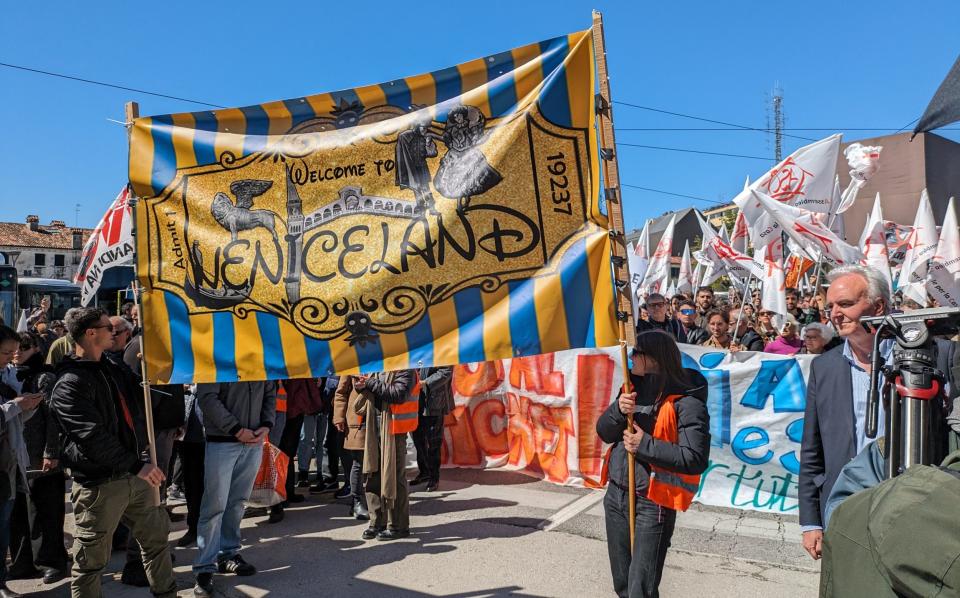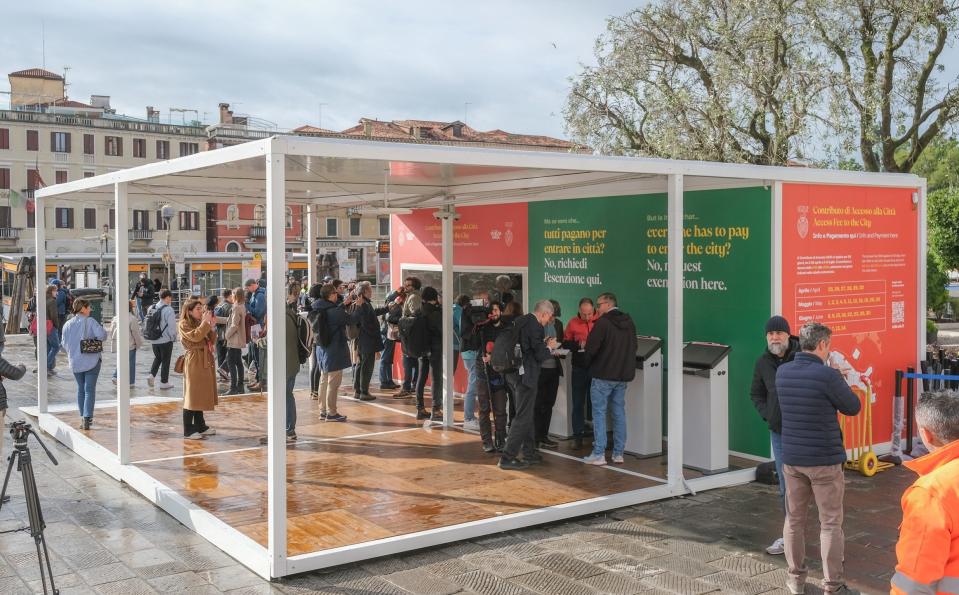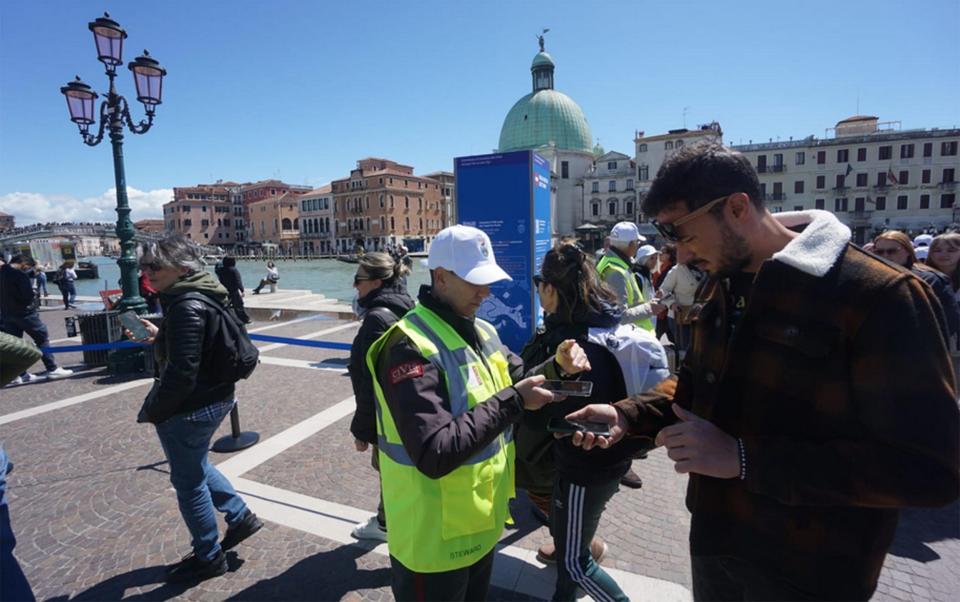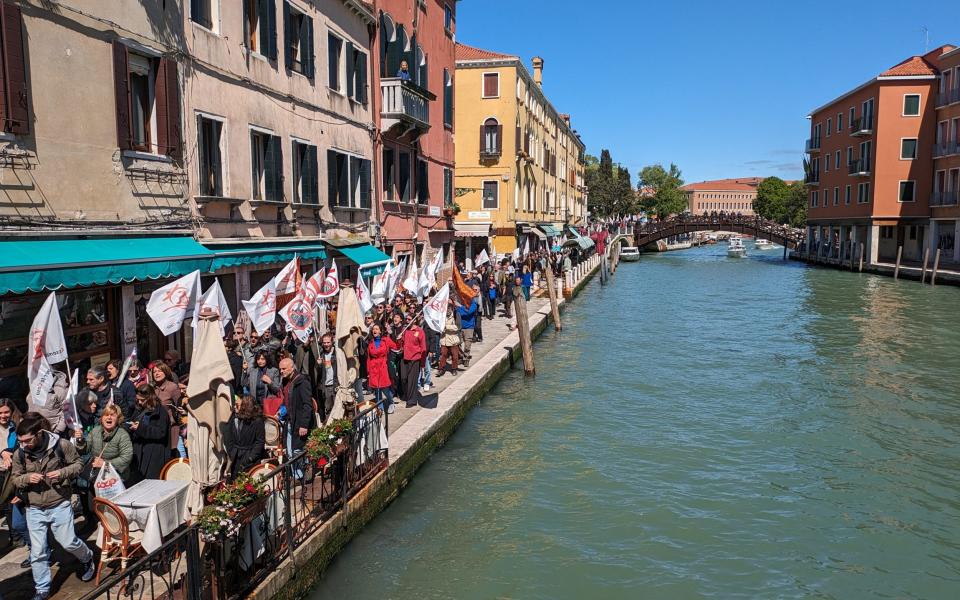The Disneyfication of Venice is complete

For many years now, locals in Venice have complained that their beloved floating city has become so overrun with tourists that it is turning into “Disneyland”. This week, the description felt particularly apt, because for the first time – here, or in any city on the planet – tourists had to buy a ticket to enter.
If you’re envisaging turnstiles and ticket stubs, it isn’t quite like that. On 29 of the busiest days of the year, day-trippers must visit a website (cda.ve.it) and pay €5 (£4.30) to download a QR code. Anyone staying overnight in the city is exempt from the charge, but they still need to register and get a QR code – the same goes for workers and guests of locals. Residents are exempt from having to get a QR code, but must carry proof of address in case they are checked. Those who breach the rules could face a hefty fine of up to €300.

After arriving at Venice’s main bus station, Piazzale Roma, on the morning of Thursday April 25, it quickly became clear that the entry fee system is flawed. As coaches unloaded thousands of tourists into the city (5,500 of whom had paid for tickets, official figures suggest), I watched on as the inspectors checked only the tiniest fraction of their tickets. Indeed, most just ambled around in their hi-vis jackets, seemingly counting down the hours to aperitivo time.
For this tourist, testing out the ticketing system proved to be a lengthy process. I had to cross the numerous bridges into the city more than 20 times before my ticket was checked, and even that was only because I was lurking suggestively. When I asked the inspector what was stopping day-trippers from pretending they were staying at a hotel and downloading a QR code for free, he suddenly couldn’t speak English and ushered me on.

Putting these practical failings to one side, the problem with the Venice entry fee is that it should either be such a substantial figure that it deters visitors, or the funds should at least be pumped back into improving the city, especially for residents. The €5 entry fee achieves neither of these things. Not a single day-tripping tourist will boycott Venice for such a small amount, and – for now at least – the funds are going solely into the staffing and processing of the ticketing system itself. It is the very definition of pointless bureaucracy.
Paul Rosenberg of Campaign for a Living Venice believes that the introduction of an entry fee was strategic. “It was created ad hoc to prevent Unesco from putting the city on the endangered list [a punishment that had been threatened],” he argues. Indeed, shortly after the move was announced, Unesco confirmed at a conference in Riyadh that Venice would be spared the embarrassment.
The problems facing Venice are so complex, so dizzying, that to suggest a €5 tourist charge will solve them is laughable. For the first time in 300 years, last year the city’s population dropped below 50,000, down from a peak of 175,000 after the Second World War. This means there are now more tourist beds in hotels and Airbnbs than residents. Where bakeries, butchers and doctors once served locals you can now buy Kylian Mbappe football shirts or lewd shot glasses. More than 30 million tourists visit each year, sometimes more than 110,000 per day.
This is a city of high-earning business owners and low-wage workers, many of whom are immigrants who commute daily on buses from the mainland. It is a city where motorised boats create such a volume of waves that the foundations of the city are crumbling. And it is a city where the mayor, Luigi Brugnaro, is building a €93 million “Forest Stadium” on the mainland for the local basketball team Reyer Venezia (which, incidentally, he owns), while 2,000 council houses in the floating city lie empty, in disrepair.
“It really would take decades of effort and concerted political will to change things,” says Rosenberg.

With all the above in mind, it came as no surprise on Thursday, at 10.30am, when thousands came together in Piazzale Roma to march against the entry fee. In between the whistles and ska music, reverberating from a boombox-on-wheels, I asked some of the protesters why they were marching.
“It’s a very bad thing for our city. Venice is not a museum, it’s a free city,” said one protester, who has lived there for many decades.
“They’re taking data from all the citizens, all the people who live in Veneto and other states of Italy. It’s kind of controlling, you know?” added a student who lives in the city.
The data collection is a particular sticking point for many Venetians, paired with the uncomfortable principle of being asked for identification in your own home town. The Venice tourism councillor Simone Venturini has suggested the tool would help in “providing more precise figures on visitor numbers”, but to some locals the infringement on civil liberties crosses a line.

Head-counting is evidently a challenge for some – after Thursday’s protests, authorities suggested there were 300 in the march (a figure that was widely regurgitated across news outlets), but the true figure, this eyewitness can confirm, was considerably higher.
At many of the protests I have experienced over the years, there is often a moment where it feels like you are witnessing history. On Thursday April 25, this moment was when the protest march came face to face with riot police in Piazzale Roma. On the front line there were not balaclava-wearing mobs-for-hire, but white-haired ladies in puffy down jackets. Looking the police dead in the eye, they unfurled their final banner.
“Welcome to Veniceland”, it read. As of this week, Venice is no longer turning into Disneyland. The transformation is complete.